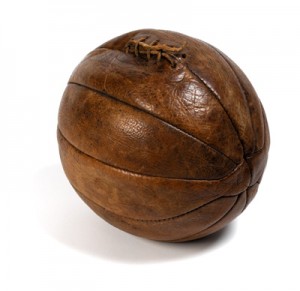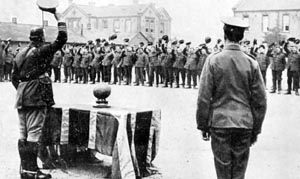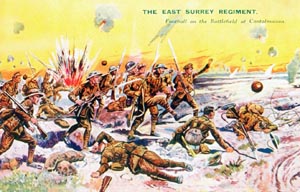The Football Charge of the Somme April 21, 2011
Author: Beach Combing | in : Contemporary , trackbackBeachcombing found himself thinking about sport and war last night. Polo teams racing at machine guns came flitting into his mind. Then there were the cinematic surfing scenes from Apocalypse Now, Empire thugs walking around ‘taming’ the natives with cricket bats (there was a post-war comic strip), the Central American Soccer War, British bill boards describing the Battle of Britain in terms of a cricket match (‘RAF Still Batting’) and, of course, the all but forgotten Football Charge from the Battle of the Somme.
The Football Charge – we are in weird war territory – was a stroke of genius on the part of a young and popular British captain Wilfred Nevill, an officer in the East Surreys.
Now Nevill belonged to that strand of the officer class: the sporting idioten that the German interrogators would so marvel at. In fact, he was a pin up boy for that all too British ideal.
Brought up on that late nineteenth-century conviction that Waterloo had been won on the playing fields of Eton men like Nevill were introduced from an early age to team sport not as recreation but as sacrament. Team sports, after all, forged groups and kept young adolescents away from morbid, unpleasant pursuits like book reading, bird-watching and masturbation.
This attitude is summed up beautifully in the bombastic if enjoyable late Victorian poem of Sir Henry Newbolt, Vitae Lampada. There a cricket game trains Britain’s future imperial warriors: ‘Ten to make and the match to win’. And, twenty years later, fighting desperately – ‘The colonel’s dead and the Gatling’s jammed’ – the memory of that distant game allows an officer to turn the battle round: ‘But the voice of a schoolboy rallies the ranks/Play up Lads, play up and play the game’.
It was only natural then that Captain Nevill – a much loved officer – should have turned to sport to ease his men into what would be an extremely dangerous charge at the German lines at Montauban on the first day of the Battle of the Somme. Nevill had bought, while away on leave, two leather footballs, one pictured above and told his men that he would give a prize to the first one to reach the balls and give them a second kick. One of the two balls was kicked by Nevill – who was shot in the head moments later with a grenade in his hand and at the barbed wire – he was twenty one. The second ball, meanwhile, was kicked out into No Man’s land by another officer, Bobby Soames.
Like their enemies across the lines British officers led from the front.
Nevill inscribed the words ‘the great European Cup Final East Surrey versus the Bavarians’ on one ball: rather more chillingly the second had the words ‘no referee’ written upon it. Both balls were later retrieved by Nevill’s men and brought back to Blighty. One stands today in the Regimental Museum. There it has understandably become an icon for the Surreys.
Back in 1916 the Football Charge quickly mutated into the stuff of legend in the homeland – two balls rapidly became four and the idea of the Surreys dribbling their way to Berlin was, in the early days, a part of the popular retelling of the Somme. British victory in Flanders though was quickly overshadowed by the appalling casualty rates and later hostile memories of the war to end all wars meant that a tale like this had to be excluded from national myth or was told in pitying tones.
30 April 2011: Football on the Somme: KMH is getting all metaphysical on us. But it is delicious stuff: ‘Time for a philosophical comment on war and sports. Instead of the carnage of war, you as a rational person might think that national differences could be resolved by a fight between one person per country or with a small team to avoid unnecessary casualties. More idealistically, rather than a blood battle, one or more sports might be substituted. Unfortunately, there is the problem of women and reproduction as part of the spoils of war. The losers forfeit their chance to perpetuate their genes, their name and their line. The reverse for the winners. If it weren’t for that fact, the human race could use a spectacle such as the Olympics to see which nations prevail over others. Cherchez la femme.’ Thanks KMH!!
Other conjunctions of sport and war: drbeachcombing AT yahoo DOT com





